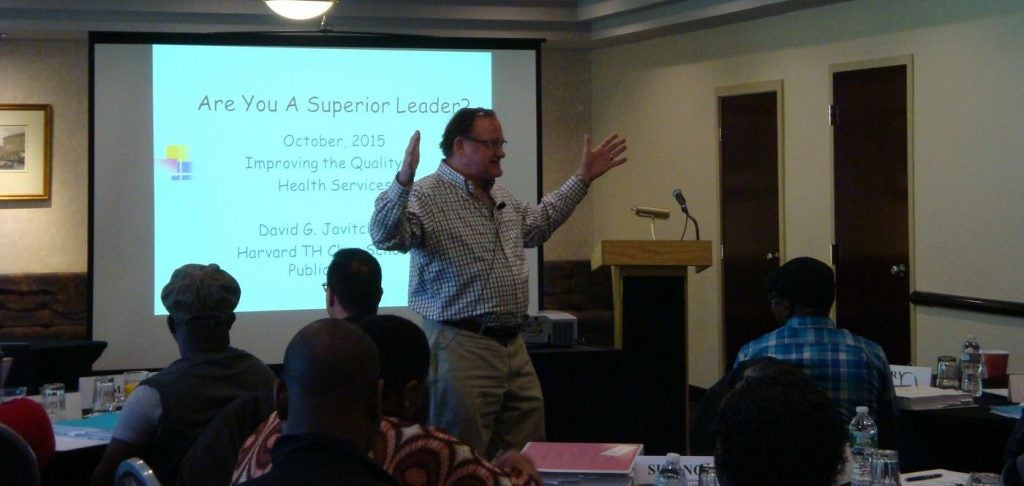
Improving the Quality of Health Services and Implications for Pandemic Preparedness and Response
October 4- 15, 2021
Online Program
Application Deadline: Extended Deadline!
Download an application (Microsoft Word Document will take a moment to load)
Purpose
Around the world governments are trying to assess and improve the quality of health services–now even more relevant in the age of COVID and other pandemics. These tasks are of even greater importance in those countries where the responsibility for providing health care is being decentralized and the private sector in taking a steadily larger role. This course has been designed to improve the conceptual and practical skills of senior officials.
Specifically, participants attending this course will:
- Learn an effective conceptual framework for the design of an overall health improvement system;
- Learn to plan strategically for health system improvement;
- Learn about the components of the “Quality Toolkit;”
- Learn about specific methods for quality improvement including clinical practice guidelines; and
- Learn how to strengthen the people aspects of the quality improvement process
Participants will be learning from experience gained in the United States, as well as many other countries of the world.
Course Topics
Content: This two-week course will cover a number of topics related to improving the quality of care in health systems. While both theory and practice will be included, the emphasis will be on practical skill building.
Topics to be addressed:
- COVID-19 and other pandemics
- Health Sector Reform and Its Relationship to Quality
- Management Reform
- Overview of Quality
- Accreditation
- Strategic Planning for Quality
- Developing and Implementing Clinical Practice Guidelines
- Human Resources
- Organizational Change
- Performance Contracting
- Negotiation and Conflict Resolution
Who Should Attend
Persons committed to improving the quality of health services in resource-constrained environments, including both policy makers and senior health care managers, will find this workshop helpful. This course will be useful for country or regional leaders engaged in health sector reforms, especially those contracting for health services with private or quasi-governmental institutions. Managers with strategic authority are appropriate from health care institutions including hospitals. An international perspective will be stressed. This course is not appropriate for people solely focused on work in the United States, or for individuals new to the health care field.
Online Educational Approach
This interactive, online course offers a blend of theory and practice, geared to an audience that is focused upon implementation rather than research. Included throughout the course are both prerecorded and synchronous lectures, polling, online Q&A, breakout groups, case studies, problem sets, and preparation of group and individual case presentations. Virtual classroom points will most often be made through active leaning methods, rather than through lectures. Facilitated online discussion among experienced participants is expected throughout. Participants are encouraged to have on hand their own country material and resources on health systems related to Quality Management; and useful in responding to COVID-19 and other pandemics.
About the Course Directors
Dr. Diana Bowser serves as co-director. Her primary academic appointment is at Brandeis University. She is Associate Professor and Director of the Masters in Science Program in Global Health Policy and Management. She has 19 years of experience in health system analysis related to health economics, health policy, and using econometric methods to evaluate health system changes in Latin America, Africa, and the United States. She has provided technical assistance and conducted research with funding from USAID, DFID, WHO, the Global Fund, Save the Children, Bill and Melinda Gates Foundation, IADB, NIH, and the World Bank. She has worked closely with the following governments on these policy issues: Nigeria, Rwanda, Ethiopia, Ghana, Namibia, Swaziland, El Salvador, Nicaragua, Honduras, Belize, Saint Lucia, Dominica, Ukraine, Kosovo, Bangladesh, and Malaysia.
Dr. Pedro J. Saturno serves as course co-director and instructor. He is a physician, AXA Professor in Improvement of Healthcare Quality at the National Institute of Public Health in Mexico, and Honorary Professor of Public Health at the School of Medicine in the University of Murcia (Spain). Saturno is also Director of a distance-learning Master in Quality Management in Health Services, currently in its 15th edition in Murcia (Spain), 3rd in Mexico and 2nd in Brazil. Previously he has served as Deputy Director General for Health Planning and Education at the Spanish Ministry of Health. From 1992 – 2000 he was a member of the core faculty for the Harvard School of Public Health executive education course, Managing Health Programs in Developing Countries. He has also extensive experience as a consultant in Quality Management for international agencies such as WHO and USAID, and participated in several international Task Forces and Committees on Quality Management, Health Prevention and Education over the last 20 years. In 2008 he received the National Quality Award in his native country for his contribution to quality in health services both nationally and internationally.
Please email us for more information at ihsg@hsph.harvard.edu.



